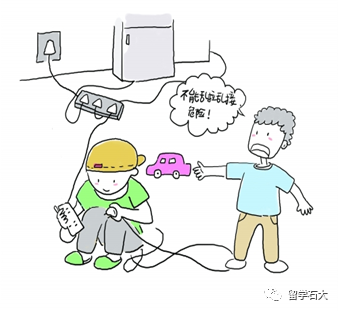Fire prevention, electricity safety is an important part of school safety work, is the common responsibility of all teachers and students. In order to strengthen the management and regulate the behavior of fire prevention and electricity consumption, we carry out special education.
Safe electricity consumption in daily life
Don't use wet hands, wet cloth touch, wipe the electrical shell. Normally, the housing of household appliances is not charged. If the wires connecting it are broken or damp and electricity leaks, the housing will become charged, and an electric shock may occur.
Don't use your hands, metal objects or pencil leads to fiddle with the switches or plug them into the socket. Don't fiddle with the wires, lamps and sockets. Because the live part may be exposed to the danger of electric shock.
Don't charge your phone, electronic component, or any other charging device for too long to prevent the device from overheating and causing a short circuit that could lead to a fire accident.
So what do we do when danger strikes?

If you find someone electrocuted, cut off the power first. Before cutting off the power supply, do not use your hand to pull the electrocutor, otherwise the rescuer will also be electrocuted. And call "120" emergency number, let the doctor to help.
In the meantime, we must be careful when we see these signs

Let's summarize the electricity requirements of the school:
The power supply in the classroom is used for teaching purposes. Students are not allowed to use it for charging.
For the students who leave the classroom or dormitory at the end, please check whether all electrical appliances are turned off.
The dormitory within the exclusive area of the use of hair dryer, do not take the high power electrical appliances back to school, such as heat, etc.
Do not connect electric wires in the campus without permission.
Do not wipe the power supply with a wet towel.
Fire prevention
How to prevent fire?
Do not place flammable items near the stove.
Open fire lighting, do not use open fire lighting to find items.
Before leaving home or going to bed, check whether the electric appliance is powered off, whether the gas valve is closed and whether the open fire is extinguished.
Use electric appliances or stoves for heating and baking clothes, and pay attention to safety.
Found gas leakage, to quickly close the gas source valve, open doors and Windows ventilation, do not touch electrical switches and use open flame, and promptly notify the professional maintenance department to deal with.
Indoor storage of gasoline, alcohol, banana water and other inflammable and explosive articles.

What to do if on fire?
Immediately call the fire alarm number 119 when a fire occurs. When calling the police, please explain the detailed address, fire location, ignition material, fire size, name and telephone number of the person calling the police, and send someone to the intersection to wait for the fire engine.
Once the fire in the home, do not panic, if the fire is not big, should quickly use the air with simple fire extinguishing equipment, take effective measures to control and fight the fire.
The oil pot fire, can not pour water to extinguish the fire, should close the stove gas valve, directly cover the pot or with a wet cloth to cover the fire asphyxiation, but also into the pot cut vegetables cooling fire.
The gas tank fire, to use wet bedding, clothing cover fire, and quickly close the valve
How to escape from a fire?
When the fire hit to escape quickly, do not greedy property.
Usually to understand the basic methods of fire escape, familiar with several escape routes.
When threatened by fire, make a prompt decision to put on wet clothes and rush to the safety exit. When escaping through the smoke, keep your body as close to the ground as possible and cover your mouth and nose with a wet towel.
The body is on fire, do not run, can roll on the spot or with heavy clothing pressure fire seedlings.
Do not take the elevator in case of fire, and escape to the safety exit.